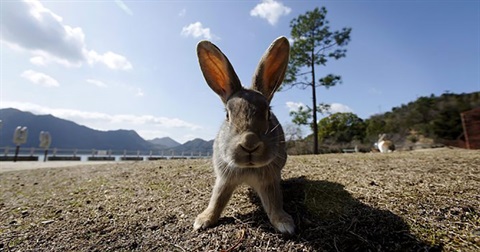Rabbits

Rabbits are a popular pet but must be housed securely.
Wild populations of previously domestic rabbits are causing big problems. These rabbits have escaped or been dumped by their owners.
Domestic and European wild rabbits are the same species. They breed very quickly, from 3 months old. Each litter is around 4-7 baby rabbits. One pair of rabbits can produce 30-40 babies a year.
Rabbits cause severe land degradation and soil erosion by digging holes deep into the ground. They eat not only the tops of plants but the roots as well. They graze on native seedlings and shrubs to the point where they cannot regenerate, reducing habitat for threatened species.
Rabbits compete with livestock and wildlife for food and water.
Rabbits are becoming an urban problem, damaging gardens, undermining house footings, destroying house termite barriers and attracting wild dogs, foxes and brown snakes closer to our homes.
Rabbit populations exist at Chinderah, South Kingscliff, Casuarina, Koala Beach, Bilambil Heights, Tumbulgum, Condong, Murwillumbah, Tyalgum and Limpinwood.
What to consider before buying a rabbit?
- Rabbits live up to 10 years and need the same level of care as dogs and cats.
- They need 6 monthly vaccinations against the calicivirus RHDV1 K5.
- You can purchase or adopt a rabbit from The Rabbit Sanctuary. Rabbit Sanctuary rabbits come desexed, vaccinated and socialised and can be returned at any time.
- Rabbits escape easily and can be very hard to catch. Keep your rabbit inside or choose a sturdy enclosure that rabbits cannot dig out of.
- Rabbits dig holes in lawns.
- Pet rabbits need to be desexed. Desexing is one of the best ways to prevent rabbit outbreaks so even if they do escape, they cannot breed. The RSPCA has low cost desexing options for low-income earners. Call 07 5536 5135 for information.
Releasing or dumping rabbits - penalties
Under the NSW Biodiversity Conservation Act 2016 (P5 Div.1 Sect. 2.6 (1)) liberating a rabbit can attract fines up to $88,000. Abandoning an animal under the NSW Prevention of Cruelty to Animals Act 1979 (P2 Sect.11) can result in 6 months jail.
Surrendering a pet rabbit
Council's pound does not accept rabbits. The Rabbit Sanctuary will take domestic rabbits for rehoming. Together with the RSPCA all surrendered rabbits are desexed, vaccinated, microchipped and then rehomed. The Sanctuary can also provide advice and support for rabbit owners.
Preventing rabbit outbreaks
To reduce the need for lethal control, Council provides information to residents and pet shops about selling and keeping rabbits.
Biological control
In 2017, phase one of a 20 year long-term rabbit bio-control strategy was implemented with the national release (at more than 550 sites) of a Korean strain of Rabbit Haemorrhagic Disease Virus, known as RHDV1 K5.
The next round of virus release took place in September 2019. If you’ve got any questions about the vaccine, please talk to your vet.
Monitoring rabbit populations
Residents are encouraged to record rabbit activity in their local area on the Rabbit Scan app. You can use the free app to see where rabbits have been recorded, population size and evidence of disease. The site also lists releases of the recent calicivirus RHDV1 K5.
Frequently asked questions
Aren’t there any other humane methods?
RHDV is one of the more humane methods of controlling wild rabbits. Basically the rabbits end up with 'cold-like' symptons, become lethargic and then die quickly. Post-infection, there is a rise in body temperature lasting up to 24 hours, followed, in 70-90% of cases, by death up to 48 hours after the onset of a fever (see Humaneness assessment: bait delivery of RHDV). The overall welfare impact prior to death has been assessed as low using the relative humaneness model developed under the Australian Animal Welfare Strategy.
This is one of a suite of control measures that will be used to reduce the population of wild rabbits. The method applied will depend on the needs at the site.
All works will be implemented by specialist contractors, and will be done in accordance with the Model Code of Practice for the humane control of rabbits, and other relevant Codes of Practice and Standard Operating Procedures.
Why do pet owners have to pay for vaccines?
This is one of the costs of having a pet rabbit in Australia. Calicivirus has been used as a method of wild rabbit control for a long time in Australia (since 1996).
There is a vaccine (Cylap®) for prevention of RHDV1 disease that has been available in Australia since 1996 for rabbit owners to vaccinate their pets.
RHDV1 K% is a variant of the strain of RHDV1 already used in Australia, RHDV1 K5 is not a new type of virus.
PetSmart - What about my pet rabbit?
What is happening with the release of the virus?
This virus is regularly being released on both public and private land in Australia where there is an issue with wild rabbits. Tweed is probably the only Council that lets the community know it is happening, as there is no legislative obligation for us to do so. PetSmart FAQs